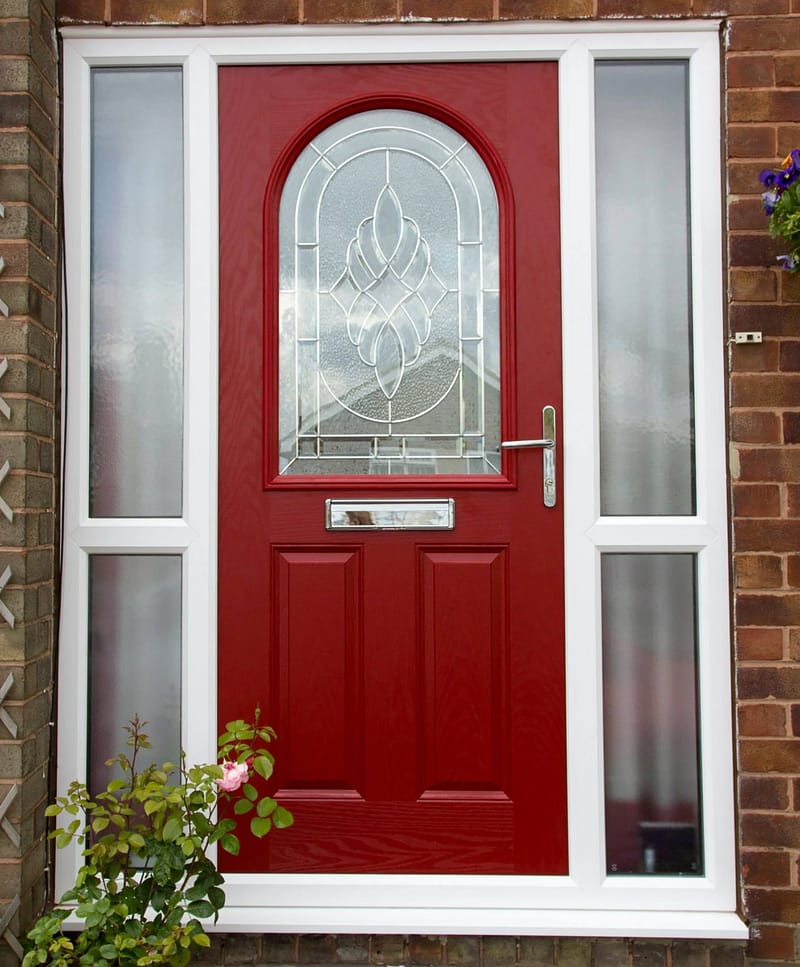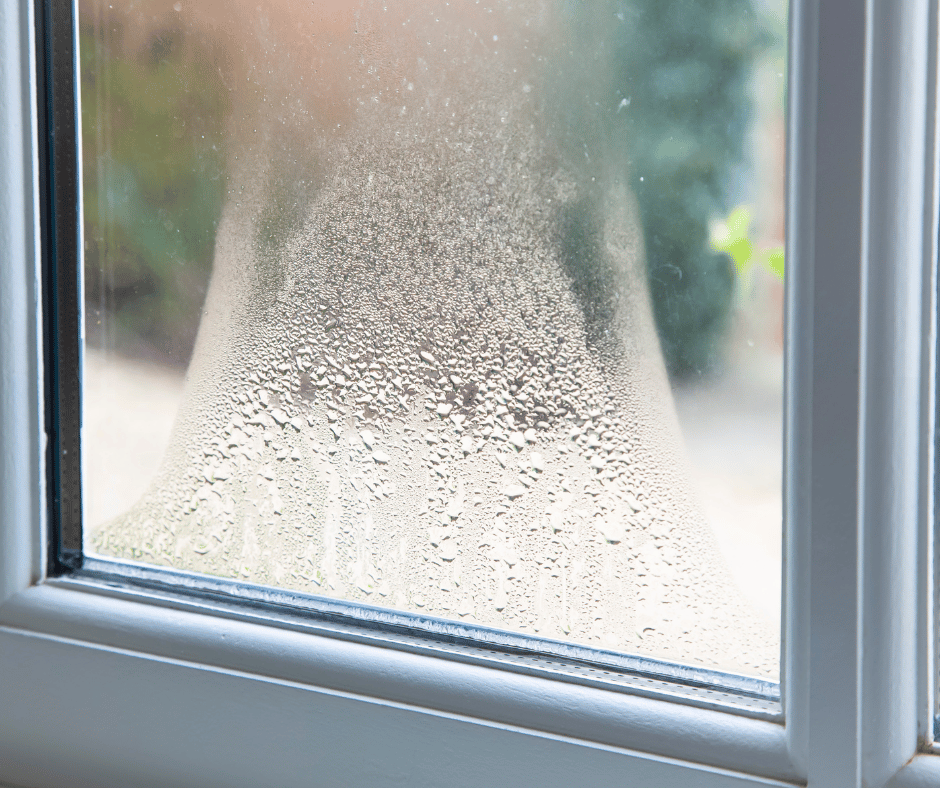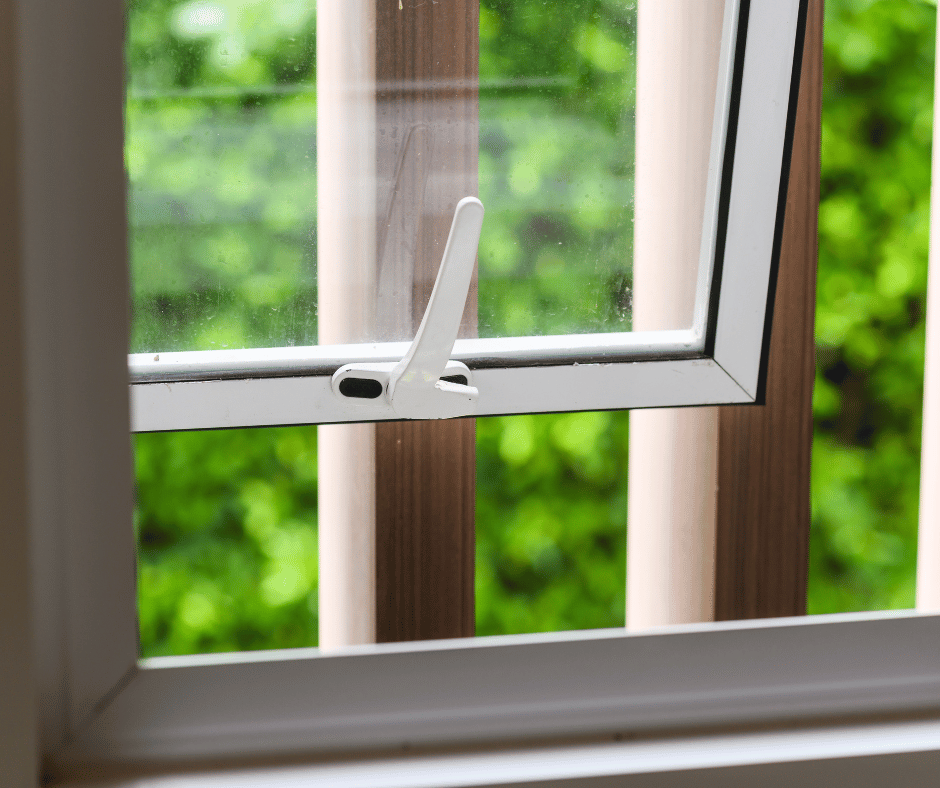Composite doors have snowballed in popularity in recent years. They combine a classical, timeless design, with modern security and quality-of-life features. With this in mind, it’s easy to see why they are so popular. But what is a composite door?
Unlike traditional timber doors, composite doors do not warp, crack or fade. This makes them a very low-maintenance option, as they keep their pristine look with little to no effort
Composite doors make for a great choice when it comes to entranceways for your home. But what exactly is a composite door, and what do you need to consider if you’re looking to have one fitted?
In this article, we’re looking at everything you need to know about composite doors. To help you on your buying journey.
What is a Composite Door?
A composite door is a kind of entrance door, built from a combination of materials. This mix of materials helps to create a door that combines classical style, with modern durability and security.
Typically, the core of a composite door is constructed from a blend of materials. These include uPVC, timber, insulating foam, and glass-reinforced plastic (GRP). Each component plays a specific role in enhancing the overall performance of the door.
For example, the uPVC and timber contribute to stability and insulation. While the GRP outer layer provides weather resistance and a stylish finish.
Composite doors have gained a lot of popularity amongst homeowners for their durability. They’re able to withstand diverse weather conditions, resist warping and fading. They provide excellent insulation, ensuring a comfortable interior environment.
Composite doors also offer a wide range of design options. Allowing you to tailor the appearance of your door to your exact style.

What is a Composite Door Made Of?
Composite doors are made up of the following materials:
- Unplasticised Polyvinyl Chloride (uPVC)
- Timber Core
- Insulating Foam Core
- Glass-Reinforced Plastic (GRP)
If those sound a bit complex, don’t worry. Here is what they are, and how they play a roll in creating a sturdy, stylish door.
uPVC
uPVC is commonly used in the frame of composite doors due to its exceptional durability and resistance to weathering. uPVC provides structural stability, ensuring the door maintains its shape and integrity over time.
Timber Core
Timber contributes to the door’s thermal efficiency, preventing heat loss and maintaining a comfortable interior temperature. A timber core also enhances the structural strength of the door.
Insulating Foam Core
Insulating foam enhances thermal efficiency and is usually found within the door panels This core material minimises heat transfer, providing excellent insulation and contributing to energy efficiency.
Glass-reinforced plastic (GRP) Skin
GRP is applied as an outer layer, contributing to the door’s resilience and aesthetic appeal. It offers robust protection against the elements. This makes a composite door resistant to fading, warping, and deterioration over time.
GRP also allows for a diverse range of stylish finishes and designs.

Composite Door Benefits:
Composite doors offer many benefits compared to older, traditional front doors, which we’ll take a closer look at below.
Durability and Longevity:
Composite doors are crafted to withstand the test of time. The combination of materials, including uPVC, timber, and GRP, creates a door that is highly resistant to warping, cracking, and fading. This durability ensures that your investment pays off over the long term.
Excellent Insulation:
The layered composition of composite doors, featuring a timber core and insulating foam, results in superior thermal efficiency. These doors excel in retaining heat, providing excellent insulation that contributes to a more energy-efficient home. This not only enhances comfort but also helps in reducing energy bills.
Weather Resistance:
The outer layer of glass-reinforced plastic (GRP) acts as a robust shield against the elements. Composite doors are highly resistant to weathering, making them ideal for withstanding rain, wind, and varying temperatures. This weather-resistant quality ensures that the door retains its integrity and appearance over the years.
Security Features:
Security is a paramount concern for any homeowner. Composite doors are sturdy and multi-layered, making these doors highly resistant to forced entry, providing an additional layer of protection for your home and loved ones.
Low Maintenance:
Unlike traditional wooden doors that may require frequent maintenance, composite doors are relatively low maintenance. The materials used are resistant to rotting, warping, and discolouration, allowing homeowners to enjoy the aesthetic appeal without the hassle of continuous upkeep.
Versatility in Design:
Composite doors offer a wide range of design options to suit diverse tastes. Whether you prefer a traditional or contemporary look, the versatility in design allows you to choose a door that seamlessly integrates with the architectural style of your home.
Composite Door Drawbacks:
While composite doors offer a wide range of benefits, it’s important to consider potential drawbacks that may influence your decision.
Cost Considerations
As amazing as they are, there are of course cost implications in choosing a composite door for your home. Due to their unique make-up, they are more costly than your standard UPVC doors.
However, as composite doors become more popular and more companies manufacture the slabs, the prices are coming down over time and the gap between the to doors are closing in terms of price.
Colour Options
It’s also always worth considering the sunlight you get on your property throughout the daytime. Customers generally want a coloured composite door, darker colours like black and anthracite grey have been the very popular ones in the last few years.
Foil finishes like the wood grain effect, can very slightly expand and contract if it is exposed to a lot of sunlight in the daytime.
There are several ways to solve this problem, including opting for a smooth colour instead. This is something our salesperson can discuss with you during your appointment.
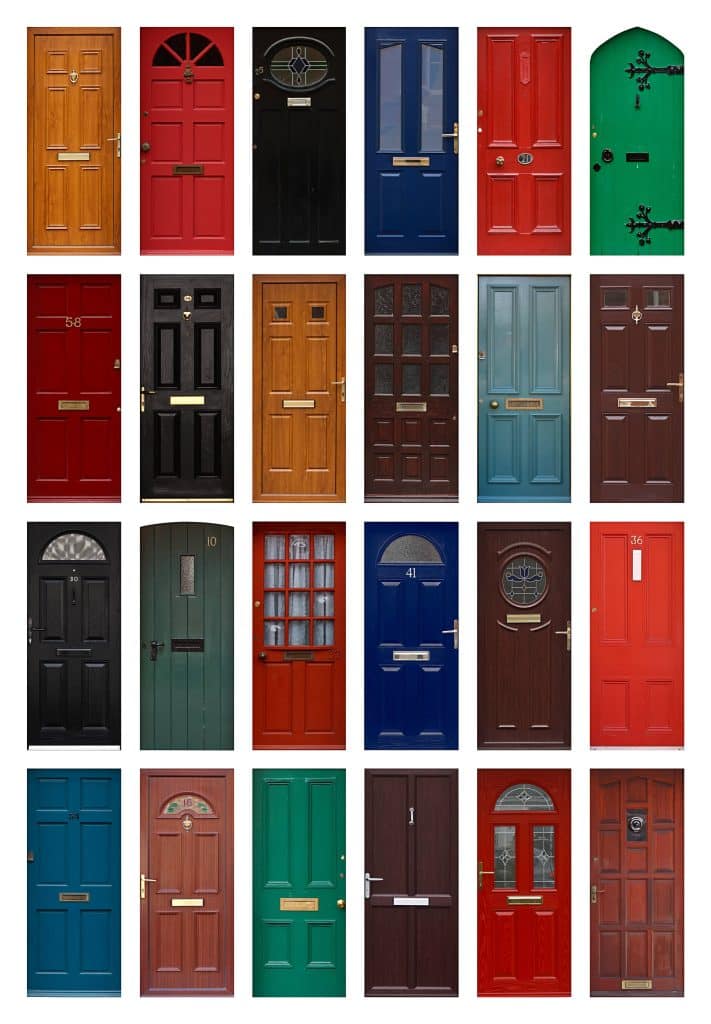
Considerations
At Celestial, we install a range of composite doors, and we often get asked which is the right door for us? We install a vast range of composite doors, some with a solid timber core and some made up of fibreglass and UPVC. Both are an improvement on the standard UPVC doors in terms of energy efficiency and all are fitted with our high-security locking system as standard, and a 10-year insurance-backed guarantee via FENSA.
Our vast range of styles and colours also means that we can easily find a composite door to suit your home and personal taste. There is a myth that composite doors are generally for a more modern style home and whilst its true that there are many contemporary styles and colours available, there are equally as many in a more traditional style that are well suited to period properties.
When you see the designs and colours available, note the energy efficiency and durability of composite doors and then add in Celestials high-security locking system and 10-year insurance-backed guarantee, its easy to see why composite doors have soared in popularity in recent years.
Our multi-point locking system will ensure your home is safe from intruders. Add in the core and thickness of a composite door and your protection is doubled. The combination also makes them impact-resistant meaning intruders have no way of crossing your threshold.
Where we Source our Composite Doors
Celestial Windows source and order the door slab (that’s the part of the door that opens) from a range of companies in the UK. Once the slab arrives to our factory, the frame, locking system, handles and hinges are manufactured on-site at our factory in Middlesbrough.
The reason for this is simple, we source the highest quality composite door slabs, but we are ultimately responsible for the manufacturing process of your composite door. This way, we can be 100% sure that anything we install has been manufactured with care and precision.
We use only the highest quality hardware that we know will stand the test of time and keep your home safe and secure for many years to come.
We currently source our composite door slabs from Solidor, Bowater, Distinction and Door Stop. Having many options is important to Celestial as it means our customers are almost guaranteed to find the colour and style, they want to reflect hie personal taste in their home.
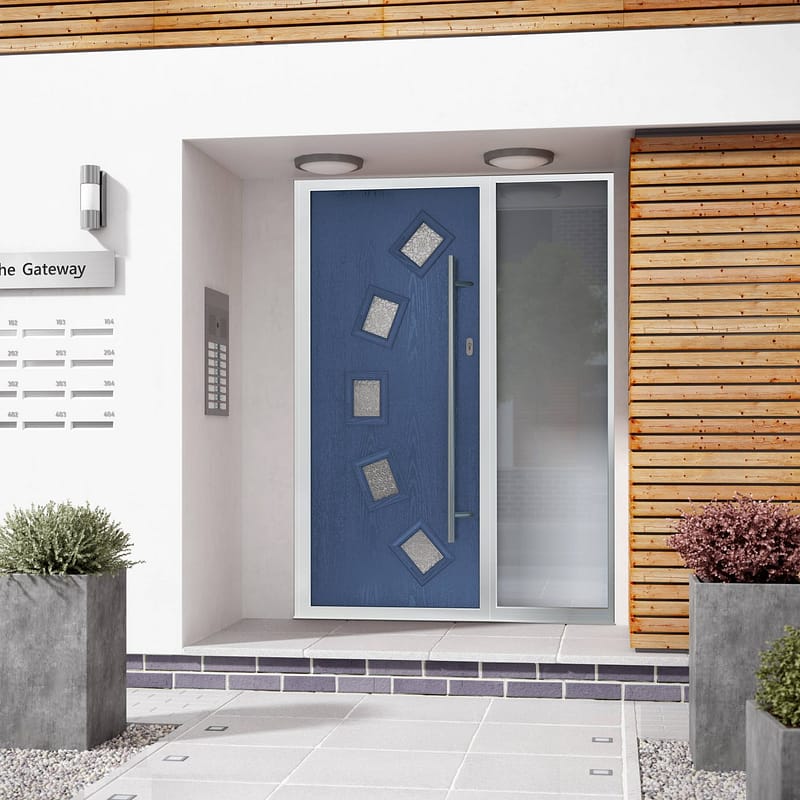
Do Composite Doors Fade in the Sun?
Composite doors do not fade in the sun anywhere near as quickly as traditional doors. Composite doors are generally coated in GRP outer skin that is surface painted. With a good composite door from a reputable company, fading is very uncommon and if it does occur, it will often be covered under your 10 Year insurance-backed backed guarantee.
Our Solidor range that have a timber core are a “through” colour ABS Skin. This is the same durable plastic as Lego, which as many will know, rarely tarnishes.
We always inform customers to wash with only water and dish soap and a soft cloth. Abrasive cleaning products that contain bleach or other harsh chemicals could affect the colour of your door and this would be easy to see upon inspection and would void the guarantee. For more on how to clean a composite door, read our dedicated guide.
What is the difference between a uPVC door and a composite door?
uPVC Doors
- Construction: uPVC doors are made solely from Unplasticised Polyvinyl Chloride, a rigid plastic material.
- Insulation: These doors provide a basic level of insulation suitable for standard requirements.
- Aesthetics: While available in various styles and colours, the aesthetic options may be more limited compared to composite doors.
- Security: uPVC doors are generally secure, though their single-material construction might make them more susceptible to forced entry.
- Affordability: One of the primary advantages of uPVC doors is their affordability, making them a popular choice for those seeking a cost-effective option.
Composite Doors
- Construction: Composite doors boast a sophisticated construction, combining materials such as uPVC, timber, insulating foam, and a glass-reinforced plastic (GRP) outer layer.
- Insulation: The layered composition results in enhanced thermal efficiency, making composite doors more energy-efficient than uPVC alternatives.
- Aesthetics: The inclusion of a timber core allows for a more authentic wood-like appearance, providing greater design versatility.
- Security: Composite doors are renowned for their robustness and security features, making them more resistant to forced entry compared to uPVC doors.
- Cost: While composite doors may have a higher initial cost, many homeowners find the long-term benefits and superior features justify the investment.
Can you Paint Composite Doors?
Yes, you can paint composite doors, and doing so offers a versatile way to customize the appearance of your entrance. While composite doors come with a durable and weather-resistant outer layer, homeowners may decide to change the colour or refresh the look over time.
Read our “Can you paint composite doors” guide for a step by step guide. Here are some key things to consider when deciding to paint (or re-paint) your composite door
- Colour Change: While painting composite doors allows for a colour change, it’s essential to note that darker colours may absorb more heat, potentially affecting the door’s performance.
- Manufacturer Guidelines: Check the manufacturer’s guidelines and warranty terms. Some manufacturers may have specific recommendations or restrictions on painting their composite doors.
- Regular Maintenance: Keep in mind that, like any painted surface, the door may require periodic maintenance, including repainting, to maintain its appearance.
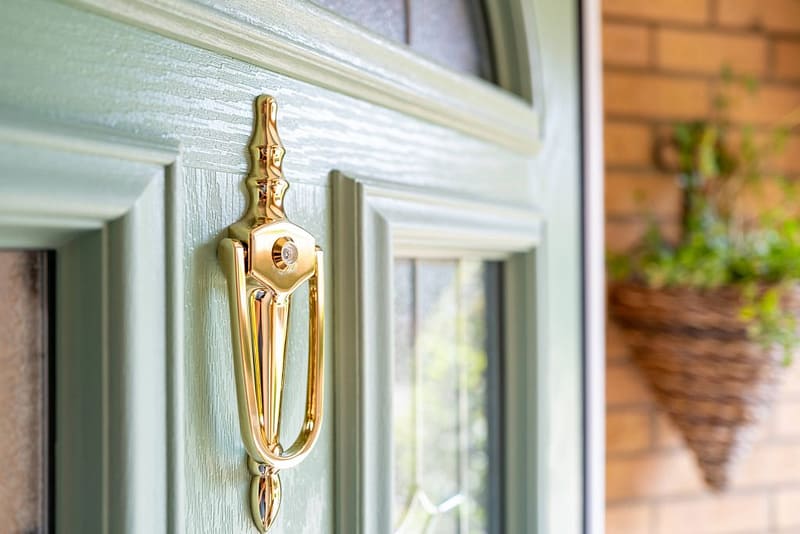
How Long Do Composite Doors Last?
The average life expectancy of a composite door is 30 years! As they are made up with the most robust materials and an outer coating made to stand the weather…and the test of time! They are hardwearing and low maintenance. Generally, the only reason to change your composite door within the next few decades would be to choose an alternative colour or style.
As a FENSA approved installer, we must meet stringent tests and are compliant with certain regulations. This gives our customer peace of mind that their installation will be exactly what they hoped for. FENSA regularly view our installations to ensure they meet their high standards and that they are compliant with building regulations and wider law. You can trust the FENSA logo, and you can trust Celestial to meet all of your standards and expectations.
Are Composite Doors Worth The Money?
Ultimate, this is up to you. However, we have put some key considerations below to help you make your mind up.
Durability and Longevity:
- Pros: Composite doors are known for their durability and can last 25 to 30 years or more with proper maintenance. They resist warping, fading, and weather-related deterioration.
- Worth It: If long-term durability is a priority and you’re looking for a door with a substantial lifespan, composite doors are worth the investment.
Insulation and Energy Efficiency:
- Pros: The layered composition of composite doors, including a timber core and insulating foam, provides excellent thermal efficiency. This can contribute to energy savings and a comfortable interior environment.
- Worth It: If energy efficiency and insulation are important considerations, the investment in a composite door can be worthwhile.
Security Features:
- Pros: Composite doors are robust and resistant to forced entry, offering enhanced security features. The multi-material construction contributes to their strength.
- Worth It: For those prioritising home security, the additional cost of composite doors may be justified by the peace of mind they provide.
Low Maintenance:
- Pros: Composite doors are relatively low maintenance, requiring occasional cleaning rather than frequent painting or sealing.
- Worth It: If you value a door that maintains its appearance with minimal effort, the reduced maintenance requirements of composite doors make them a worthwhile investment.
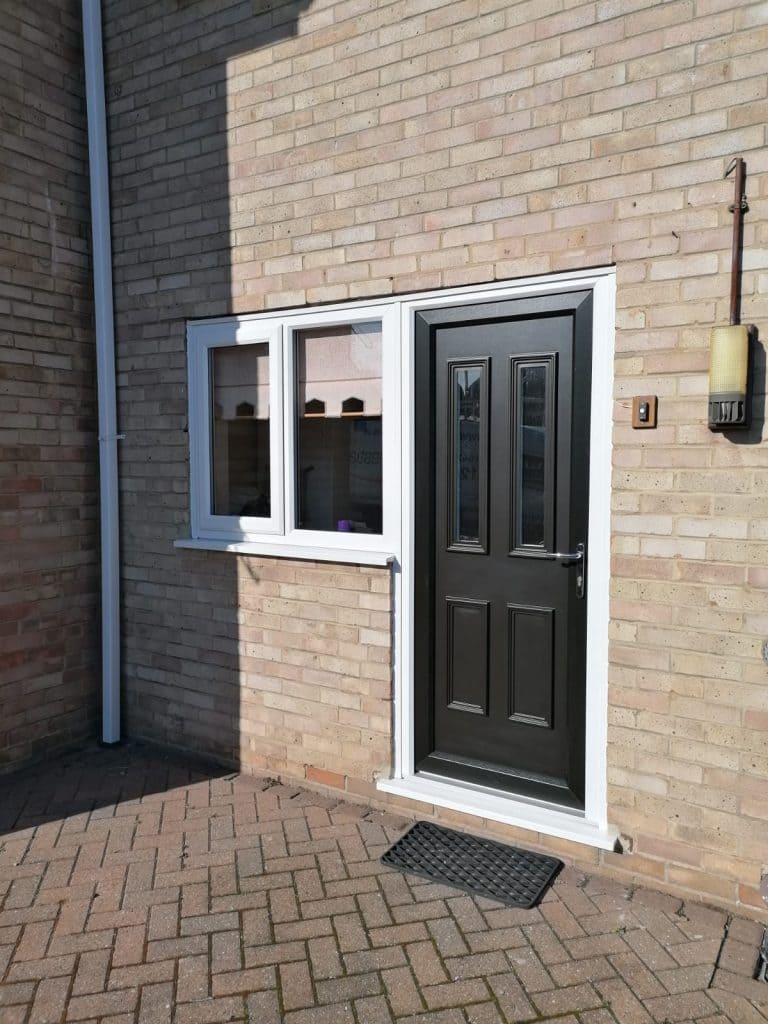
Aesthetic Options:
- Pros: Composite doors offer a wide range of design options, finishes, and colours, allowing for greater personalisation.
- Worth It: If you seek a door that complements the aesthetic of your home and offers design versatility, the variety of options with composite doors can make them worth the investment.
Initial Cost vs. Long-Term Value:
- Consideration: While the initial cost of composite doors may be higher than some alternatives, their long lifespan, durability, and energy efficiency can contribute to long-term value.
- Worth It: If you view your purchase as a long-term investment and consider the benefits over the years, composite doors can be seen as worth the money.
Its easy to see why, in the last decade, composite doors have taken off in such a big way. If you’re wondering how much is a composite door fitted – we’ve covered that in a dedicated post.
They’re hard wearing and low maintenance but also come in a range of styles and colour to suit all homes. Your front door is the first thing that visitors see, so why not make it suit your property and your personal taste!
Celestial Windows have been manufacturing and installing high quality UPVC products since 1998. We are a family run business with a company policy based on the safety of your family and your trust in us to ensure you get exactly what your hoping for. With high security locking systems as standard and a 10 year insurance backed guarantee, we are confident we can install the door way you’ve always wanted.

